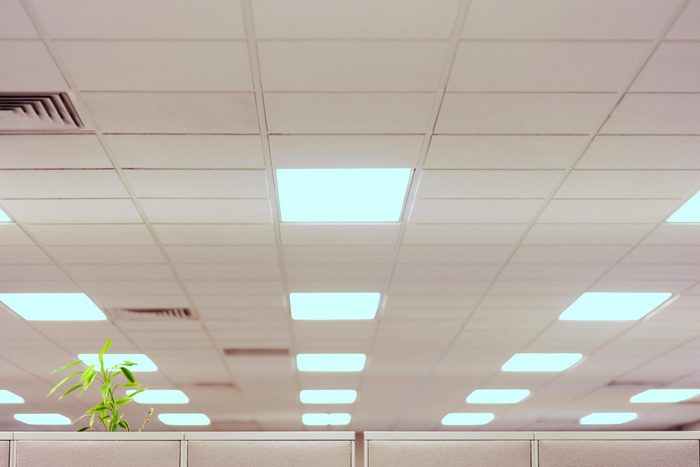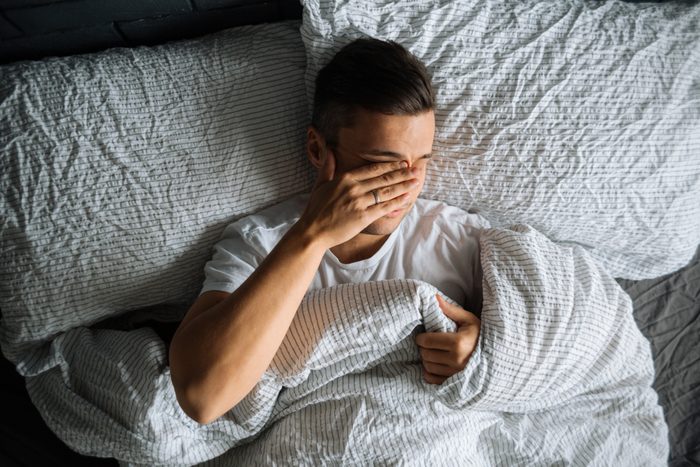
Much of our modern lives depend on artificial light. In schools, offices and most public places, light usually comes from overhead via fluorescent or LED bulbs. These lights are practical and economical, but doctors say that long-term exposure to overhead lights can cause some issues. According to Mahmud Kara, MD—a doctor who started his career treating patients at the Cleveland Clinic and now focuses on functional medicine and natural remedies: “When the body, or the eye specifically, perceives light, it processes various chemical signals which communicate with other areas of the body to perform certain functions.” How’s that for enlightening?
Some people like the stimulating effect of bright, overhead light, while others prefer a softer, dimmer environment—what some interior design professionals refer to as “quiet light.” If you’re one who prefers the latter, it may be because you’re particularly sensitive to overhead light, which can affect your sleep, cause migraines, disrupt hormones and more.
Here, Dr. Kara and other licensed healthcare professionals reveal the actual health reasons some of us might in fact find it worthwhile to avoid bright, overhead lights.

Overhead lights disrupt our sleep
When it comes to sleep, the body uses light specifically to regulate its circadian rhythm, or 24-hour internal clock, which helps determine when it’s time to be alert and when it is time to rest. “When light enters the eye, nerve signals are processed throughout the body,” Dr. Kara explains. “Therefore, exposure to overhead lights, especially very bright overhead lights, may cause you to feel more alert and unable to wind down for sleep.”
Blue light-blocking glasses have seen a surge in popularity after some research has shown that blue light might be messing with us, though it’s worth mentioning that blue light has a hidden benefit. “Exposure to short wave (blue) light in the evening has been shown to suppress melatonin output, disrupting circadian rhythms and affecting restorative REM sleep,” explains Carly King, ND, a naturopath in Hamilton, Ontario.
The New York Times recently called REM sleep a “magical,” critical element for emotional health and brain function. Indeed, says Dr. King, “REM sleep supports important cognitive processes, such as memory consolidation and emotional regulation.”
Ideally, you should sleep in the dark and ensure your room is free of sneaky light sources such as televisions, cell phones and other digital devices.
I Took Magnesium to Help Me Sleep for a Month—Here’s What Happened

Overhead lights cause headaches
Some people just don’t like overhead lights and prefer focused, warmer light, but for others, it’s not just about liking or disliking them—it’s about headaches.
A study at Beth Israel Deaconess Medical Center in Boston showed that overhead lights trigger or exacerbate migraines. Says Dr. Kara: “Studies have found that when light enters the eye, it can activate the same nerve cells in the brain that are active during a migraine attack, which may explain why overhead lights tend to exacerbate migraine attacks.”
If lights often seem too bright for you, you may have photophobia, which isn’t an actual phobia but a medical term that refers to ophthalmic and neurologic symptoms that are the result of bright light exposure. According to the American Ophthalmic Association, 80% of people who have migraines also suffer from photophobia.

Overhead lights cause eye strain
Even if you don’t get migraines, overhead lights can do a number on your eyes, leading to dry eyes, blurred vision and burning. Dr. Kara points out that blurry vision can also lead to nausea, irritability and other secondary effects. “Eye strain is another issue often related to overhead lights, as well as the blue light emitted from digital devices,” Dr. Kara says. “Chronic exposure to overhead lights and blue light can cause the cells in the eye that detect light to become overstimulated.”

Overhead lights take a cognitive toll
Disrupted sleep, migraines and disrupted vision from overhead lights have an effect on our ability to think, often resulting in sensory overload. “Sensory overload responses, or sensory conditions, are quite common and often coexist with other psychological disorders like ADHD or PTSD,” Dr. Kara says.

Overhead lights disrupt our hormones
Because light exposure can disrupt our circadian rhythms, it also affects our menstrual hormones—explains BreAnna Guan, ND, a naturopathic physician in Boston who specializes in women’s hormonal health: “The suppression of melatonin by light is dose-dependent, such that the greater the intensity of light, the more melatonin is suppressed.”
Dr. Guan further explains that when we’re exposed to overhead lighting, our bodies reduce their melatonin production, thereby reducing estrogen levels. “If we have more light exposure at times when naturally there would be more darkness, we can actually impact our hormone levels and increase levels of estrogen,” Dr. Guan says, pointing to studies that have shown women who are totally blind have a lower risk of breast cancer, and women working night shifts may have an increased risk of various cancers. Way to work, ladies—just take good care.
